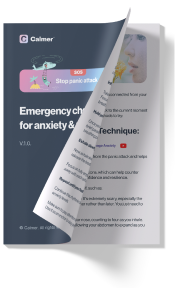- Anxiety in relationships comes from past experiences, your attachment style, and how secure you feel
- Your gut feelings come from deep inside you. It’s important not to act out of fear or worry
- Knowing why you’re anxious and telling it apart from your gut feelings can help you handle relationship anxiety better
Ever found yourself torn between trusting your gut and succumbing to relationship anxiety? It’s a common dilemma that can leave even the most self-assured among us feeling perplexed.
But fear not because deciphering between the two might not be as tricky as you think. But first, let’s kick things off with a mind-boggling statistic:
Did you know that approximately one marriage ends every 36 seconds in the U.S.? That’s right, and there were 689,308 total divorces in the U.S. in 2021.
So, let’s explore how to distinguish between gut feelings and relationship anxiety to improve our relationships and don’t end up as part of the statistic.
The Difference Between Anxiety and Intuition
| Relationship Anxiety | Gut Feelings | |
| Definition | Excessive worry or fear about the relationship | Intuitive sense or instinctive reaction |
| Emotional Response | Fear, insecurity, jealousy | Intuition, sense of clarity or unease |
| Physical Symptoms | Increased heart rate, sweating, stomach issues | Butterflies in the stomach, tightness in the chest |
| Triggers | Past traumas, insecurities, uncertainty | Subconscious cues, intuitive impressions |
| Influence on Behavior | Overthinking, seeking constant reassurance | Acting on instinct, feeling drawn or repelled by a situation |
| Impact on Communication | Difficulty expressing thoughts and feelings | Clear communication, trusting instincts |
| Trust and Security | Leads to trust issues, doubts about partner’s loyalty | Often signals trust or distrust in a person or situation |
| Approach to Problem-Solving | May lead to avoidance or controlling behavior | Encourages honest dialogue and problem-solving together |
Gut feelings are helpful in relationships, but you need to distinguish between them and anxiety.
Anxiety often makes you feel fearful or worried about something terrible happening soon.
While it’s normal to feel anxious when stressed or unsure, it could also suggest an underlying mental health issue.
Intuition, on the other hand, is like an inner knowing that something isn’t right. It usually brings a sense of calm or clarity instead of fear or worry. It also pulls you in one direction.
While intuition can guide us well in relationships, you simply must be aware of any underlying fears or biases that could influence our judgment.
In the end, trusting your gut can be a game-changer in relationships. But only if you tune in and decipher whether it’s anxiety or intuition speaking.
By digging deep into the why behind your gut feelings and staying mindful of any hidden fears or biases you might have about your partner, you not only gain insight into yourself but also lay the groundwork for stronger, healthier connections.
Now, let’s explore relationship anxiety and gut feelings even further.
Understanding Relationship Anxiety
Relationship Anxiety or Gut Feeling?
Most people will encounter a certain amount of relationship anxiety sooner or later.
Picture this: You’re in the middle of a great relationship. You’ve been together for several years.
But all of a sudden, instead of feeling warm and fuzzy, you’re hit with a wave of fear, concern, or unease.
That’s relationship anxiety — where worries about abandonment, jealousy, and insecurity often take center stage.
Though it is not a diagnosed mental health condition, relationship anxiety can significantly affect your emotional well-being.
Still, it’s perfectly normal to grapple with vulnerability and uncertainty as you form close relationships.
Curious about how anxiety can show up physically, like causing shortness of breath? Read our in-depth article, Can Anxiety Cause Shortness of Breath? for all the details.
Some people naturally have higher levels of relationship anxiety than others. It could be because of past experiences, the way they attach to others, or just their personality.
Common Causes and Triggers of Relationship Anxiety
There are many triggers for relationship anxiety. However, here are the most common ones:
- Being afraid of being rejected or left behind
- Feeling unsure about yourself or the relationship
- Worrying about getting hurt again, like feeling betrayed or experiencing heartbreak
- Having different values or beliefs
- Not communicating well or trusting each other
Aside from these triggers, there are a lot of underlying causes for relationship anxiety, such as:
- Childhood experiences that led to attachment problems
- Past relationships involving trauma or abuse
- Dealing with anxiety and depression
- Repeating patterns in relationships over time
So, for instance, you feel anxious about the possibility of being rejected or abandoned by your partner, leading to insecurity and self-doubt in the relationship.
Once again, feeling anxious in a relationship is completely normal and happens to many people.
It doesn’t mean you’re weak or lacking in any way, and it’s not necessarily a sign that something’s wrong in your relationship.
Once you understand what’s causing your anxiety, you can work on strategies to manage it and create a healthier relationship.
And what can help you with that is the new Calmer app. It’s a free mobile app for instant and long-term anxiety and panic attack relief.
From soothing swipeable affirmation cards and animated breathing techniques to guided meditations and relaxing soundscapes, you have it all in one place.
Now, let’s discuss gut feelings and how to identify them.
Understanding Gut Feelings in Relationships
Gut feelings, often referred to as intuition, play a significant role in our relationships. These instincts can guide us toward making decisions, both big and small, that can impact the course of our romantic connections.
But how do they influence our relationships?
They often provide subtle cues about our partner’s behavior, the direction of the relationship, and potential red flags that we might overlook consciously.
These instincts can affect how we feel about someone, influencing the level of trust, attraction, and emotional connection we experience.
Plus, by paying attention to our gut feelings, we can:
- Better communicate our needs
- Set boundaries
- Make choices that match our values and desires in the relationship
How to Identify Gut Feelings
Gut feelings aren’t always rational or logical, but they can be a strong signal that something isn’t right with your relationship.
There are some standard signals for gut feelings:
- An ill feeling or upset in your stomach
- A visual or other sensory impression that things aren’t quite right
- A creepy, spooky, or foreboding feeling
- A feeling compelling you to act
So, for example, gut feelings can alert you to subtle cues or red flags in your partner’s behavior or communication that might otherwise go unnoticed, prompting you to investigate or address issues before they escalate.
By paying attention to these signals, you can learn to trust your gut and make better decisions in your relationships. But you also need to understand what they’re trying to tell you.
Effects of Anxiety on Relationships
Signs Your Anxiety Is Ruining Your Relationship
Anxiety can impact your relationships with others in many ways. It sets up communication barriers, creates trust problems, and forms dependency or independence issues.
1) Communication Barriers
Let’s break down how anxiety can mess with communication in relationships. When anxiety takes over, expressing yourself to your partner becomes tough. You might clam up, avoiding conversations altogether.
And even when you do try to talk, your partner might not get you like they should. This all results in misunderstandings and unnecessary fights that strain your bond.
To fix this, you need to be a good listener and speak honestly. Start by clearly sharing your thoughts and feelings with each other, as that’s the foundation of good communication.
Encourage your partner to do the same. And remember, don’t jump to conclusions without hearing each other out.
Compromise and making decisions together are crucial for keeping your relationship strong through tough times.
2) Trust Issues
When anxiety creeps in, it can make you doubt your partner’s loyalty and commitment. This causes jealousy, possessiveness, and even control issues that can damage your connection.
For instance, you start dictating your partner’s actions or behaviors, trying to control who they see or what they do in an attempt to ease your anxiety.
To build trust back up, honesty and transparency are key. Don’t keep things hidden.
Give them the whole picture of what’s going on in your head and heart. It’s also crucial to give each other space and independence.
Encourage your partner to make their own choices and decisions. This will help you start rebuilding trust and strengthening your bond.
3) Dependency and Independence Issues
Anxiety can also create a problem of dependency or independence in a relationship. You start relying too much on your partner for emotional support and validation.
On the flip side, you could also withdraw or avoid opening up to them altogether.
This rollercoaster can lead to unhealthy patterns like codependency or emotional distance, putting strain on or even ruining your relationship altogether.
Focus on self-care and self-validation to strike a healthy balance. It’s crucial to meet your own emotional needs and learn to validate yourself instead of relying solely on your partner.
At the same time, don’t forget to maintain your individuality and pursue your interests and goals.
My wife and I are mostly independent of each other. Yet, we aren’t too independent. We still make many important decisions together. I couldn’t even imagine if she came over to me for every single thing.
There’s no way that’s sustainable in any relationship.
How to Cope With Relationship Anxiety
Dealing with relationship anxiety is tough, no doubt about it — it can really throw a wrench into your life.
For example, you need to constantly text or call your partner to check on their whereabouts or to seek reassurance about the relationship.
Or you spend hours dissecting every word of a text message or email from your partner, trying to read between the lines for hidden meanings.
But the good news is, there are ways to tackle it head-on and get back on track. Here are some strategies to help you manage relationship anxiety:
1) Self-Awareness and Reflection
Start by thinking about your thoughts and feelings. Reflect on past experiences to uncover any patterns or triggers behind your anxiety.
Once you pinpoint these triggers, you can work on coping strategies to deal with them.
Keeping a journal is a helpful tool for increasing self-awareness and identifying patterns.
Simply jotting down your thoughts and feelings can reveal underlying triggers and provide a means of coping with your emotions.
Read here for more about how to start one and what benefits you can experience from it.
2) Communication Strategies
Practical communication is key to managing anxiety in a relationship. Be sincere with your partner about your thoughts and feelings.
This helps prevent misunderstandings and builds confidence within the relationship.
I always use “I” statements when I’m discussing things with my wife, as this is particularly effective in communication.
By framing your feelings as personal experiences rather than blaming your partner, you can express yourself without placing blame.
For example, saying “I feel like you don’t listen to me” instead of “You never listen to me” encourages constructive dialogue and promotes understanding.
3) Seek Professional Therapy and Support
When relationship anxiety hits hard, it’s time to reach out for help. Therapy offers personalized tools and strategies to manage anxiety and improve communication.
Plus, joining support groups lets you connect with others who get it, providing validation and a sense of camaraderie.
How to Build and Maintain Good Relationships
Building and maintaining good relationships is often hard work and involves building trust and emotional intimacy while maintaining individuality.
Building Trust
Let’s talk about the cornerstone of any relationship: trust. Without trust, genuine intimacy and connection become impossible.
Building trust means being honest and open with your partner. That means being upfront about your feelings, needs, and desires, even when it’s tough.
Actions speak louder than words, so if you say you’ll do something, follow through.
Consistently keeping your promises shows your partner they can rely on you, demonstrating that you value their time and feelings.
It’s these small gestures that lay the foundation for a strong and trusting relationship.
Developing Emotional Intimacy
Building emotional intimacy starts with being vulnerable with your partner. Only when you’re open about your feelings, fears, and insecurities without fear of judgment can there be support and understanding.
Another way to promote emotional intimacy is by dedicating quality time to each other. This means more than just being physically present. You need to connect on a deeper emotional level.
Spend time talking, sharing experiences, and being intimate to strengthen the emotional connection between you and your partner.
These efforts can nurture a deeper and more fulfilling relationship.
Maintaining Individuality
It’s great to be close with your partner, but don’t forget to keep being yourself, too. That means having your own hobbies and spending time with friends and family.
And don’t forget to respect your partner’s interests and dreams, too. Let them do their thing while you do yours. It’s all about supporting each other while staying true to who you are.
The Bottom Line
Stick to these basic principles when dealing with your partner, and you’ll build a solid, thriving relationship that grows over time.
Just be patient, open, and honest with each other, making your connection the top priority. That’s the key to a lasting and fulfilling bond.
I hope that you found this article useful and interesting. If so, please take a look at the other articles in our blog, and if you want to start managing your anxiety and get relief from panic attacks, we’ve built Calmer, a free mobile app for instant and long-term anxiety and panic attack relief.




